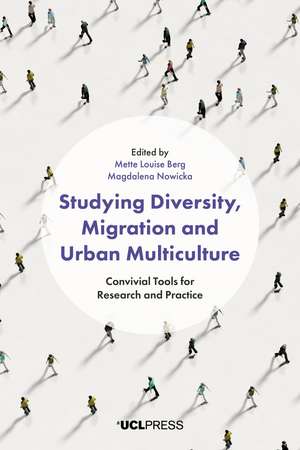Studying Diversity, Migration and Urban Multiculture: Convivial Tools for Research and Practice
Editat de Mette Louise Berg, Magdalena Nowickaen Limba Engleză Hardback – oct 2020
Drawing on a range of innovative and participatory methods, each chapter examines conviviality in different cities across the United Kingdom. The contributors ask how the research process itself can be made more convivial and show how power relations between researchers, those researched, and research users can be reconfigured—in the process producing much needed new knowledge and understanding about urban diversity, multiculturalism and conviviality. Examples include embroidery workshops with diverse faith communities, arts work with child language brokers in schools, and life story and walking methods with refugees. Studying Diversity, Migration and Urban Multiculture is interdisciplinary in scope and includes contributions from sociologists, anthropologists, and social psychologists, as well as chapters by practitioners and activists. It provides fresh perspectives on methodological debates in qualitative social research, and will be of interest to scholars, students, practitioners, activists, and policymakers who work on migration, urban diversity, conviviality and conflict, and integration and cohesion.
Preț: 292.10 lei
Nou
Puncte Express: 438
Preț estimativ în valută:
55.90€ • 60.70$ • 46.96£
55.90€ • 60.70$ • 46.96£
Carte indisponibilă temporar
Doresc să fiu notificat când acest titlu va fi disponibil:
Se trimite...
Preluare comenzi: 021 569.72.76
Specificații
ISBN-13: 9781787354807
ISBN-10: 1787354806
Pagini: 214
Ilustrații: 18 color plates
Dimensiuni: 235 x 159 x 25 mm
Greutate: 0.57 kg
Editura: UCL Press
Colecția UCL Press
ISBN-10: 1787354806
Pagini: 214
Ilustrații: 18 color plates
Dimensiuni: 235 x 159 x 25 mm
Greutate: 0.57 kg
Editura: UCL Press
Colecția UCL Press
Notă biografică
Mette Louise Berg is an anthropologist and associate professor at the Thomas Coram Research Unit within the Department of Social Sciences at University College London.
Magdalena Nowicka is a sociologist and professor of migration and transnationalism at the Institute of Social Sciences at Humboldt University of Berlin. She is also head of the Integration Department at the German Centre for Integration and Migration Research in Berlin.
Magdalena Nowicka is a sociologist and professor of migration and transnationalism at the Institute of Social Sciences at Humboldt University of Berlin. She is also head of the Integration Department at the German Centre for Integration and Migration Research in Berlin.
Cuprins
1. Convivial tools for research and practice: An introduction
Mette Louise Berg and Magdalena Nowicka
Part I: Conceptualising and performing conviviality
2. Convivial research between normativity and analytical innovation
Magdalena Nowicka
3. Convivial practices in communities of research
Ann Phoenix
Part II: Convivial collaborations
4. The fabric of faith: a reflection on creative arts practice research
Claire Dwyer, Nazneen Ahmed, Katy Beinart
5. Examining conviviality and cultural mediation in arts-based workshops with child language brokers: Narrations of identity and (un)belonging
Sarah Crafter and Humera Iqbal
6. Migration, memory and place: walking as a convivial methodology in participatory research.: A visual essay
Maggie O’Neill, Bea Giaquinto, and Fahira Hasedzic
Part III: Ethics, relationships, and power
7. Failing better at convivially researching spaces of diversity
Ben Gidley
8. Making something out of nothing: On failure and hope in community activism and research
Agata Lisiak and Alicja Kaczmarek
9. Ethnographies of urban encounters in super-diverse contexts: Insights from Shepherd’s Bush, west London
Adele Galipo
Part IV: Reflections on convivial research and practice
10. Strategies to make conviviality the heart of campaigns for the rights of migrants
Don Flynn
11. Breaking down barriers to co-production with civil society
Karin Woodley and Charlotte Gilsenan
12. Afterword: Giving multiculture a name
Les Back
Mette Louise Berg and Magdalena Nowicka
Part I: Conceptualising and performing conviviality
2. Convivial research between normativity and analytical innovation
Magdalena Nowicka
3. Convivial practices in communities of research
Ann Phoenix
Part II: Convivial collaborations
4. The fabric of faith: a reflection on creative arts practice research
Claire Dwyer, Nazneen Ahmed, Katy Beinart
5. Examining conviviality and cultural mediation in arts-based workshops with child language brokers: Narrations of identity and (un)belonging
Sarah Crafter and Humera Iqbal
6. Migration, memory and place: walking as a convivial methodology in participatory research.: A visual essay
Maggie O’Neill, Bea Giaquinto, and Fahira Hasedzic
Part III: Ethics, relationships, and power
7. Failing better at convivially researching spaces of diversity
Ben Gidley
8. Making something out of nothing: On failure and hope in community activism and research
Agata Lisiak and Alicja Kaczmarek
9. Ethnographies of urban encounters in super-diverse contexts: Insights from Shepherd’s Bush, west London
Adele Galipo
Part IV: Reflections on convivial research and practice
10. Strategies to make conviviality the heart of campaigns for the rights of migrants
Don Flynn
11. Breaking down barriers to co-production with civil society
Karin Woodley and Charlotte Gilsenan
12. Afterword: Giving multiculture a name
Les Back
